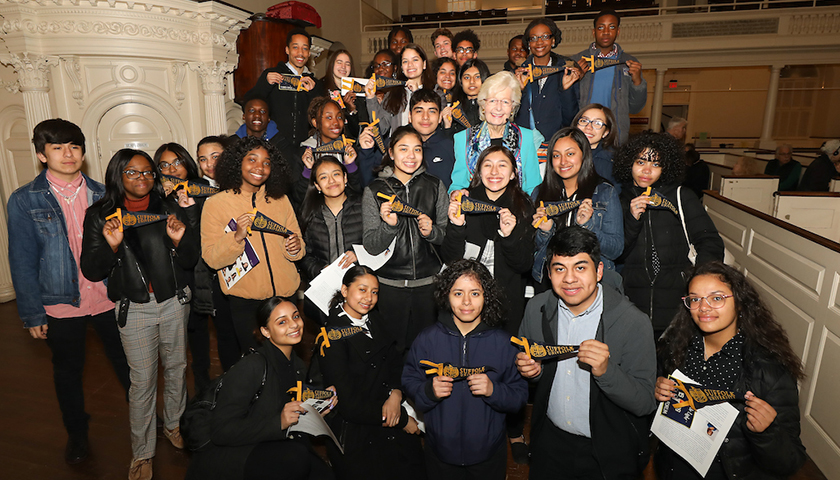To Change the World, 'Start Small'

“Start small,” said the South African-born “unpolitical daughter of unpolitical parents,” focusing on a group of Bronx high school students, one of whom had just asked her about how to start changing the world.
Margaret Marshall’s other advice for the 31 teens who joined the crowd at last night’s Ford Hall Forum event was to continue doing what the young questioner had just done. “When it’s not too comfortable, stand up and do something that doesn’t feel easy for you.”
The former chief justice of the Massachusetts Supreme Judicial Court, who in 2003 forever altered her adopted America by declaring the right of Massachusetts persons of the same gender to marry, then asked that her listeners to “look for the person who feels most excluded and see if you can extend a hand and include them.”
The Ford Hall Forum at Suffolk University held the session at Old South Meeting House, with Boston Public Radio host Margery Eagan moderating the conversation.
A revealing journey
Marshall spoke of growing up without television in a small, all-white South African town. She said her knowledge of her home country was severely limited until she came to America in the early 1960s as a high school exchange student in Delaware. She returned in 1968 to pursue what she intended to be a PhD in art history at Harvard.
“I learned more about my country in the United States,” she told Eagan, because she was able to read books that were banned in South Africa. "The blindness that I had before was lifted. When I went back to South Africa I started to see things in different ways."
She had been shocked to see America television presenters challenge authority figures, even President John F. Kennedy. No one did that in South Africa. The few who risked it were imprisoned. And those imprisoned were only allowed one visitor a year.
As president of the National Union of South African students, Marshall organized transportation for family members visiting imprisoned political opposition leaders. In apartheid South Africa opposition politicians were “banned,” which meant they could not be with more than one person at a time. But in those car rides she was able to talk with black women.
"Little acts like that,” she said. "And the government didn't appreciate that. And that's where I learned to talk,” said Marshall. “I have learnt so much from all kinds of people. Just listening.”
She told how her student union, dissuaded from inviting the Rev. Martin Luther King, Jr., to South Africa, instead invited New York Sen. Robert F. Kennedy. How Kennedy was unable to bring a security detail of more than two people. And how his words, which she read to the group, still resonate with her today.
Banished
She returned to the United States only to learn that she would be arrested if she were to reenter South Africa. The only exception was made when she went home to say goodbye to her father before he died.
Marshall described the United States as “a very impatient nation” with little memory of its own history.
She railed against unlimited freedom of speech. ”We're not balancing. We're just saying anything goes. …There are great democracies that don't interpret free speech in the same way."
She argued that appointments to the U.S. Supreme Court should be, not for life, but rather until a person is 70, as is the case with the Massachusetts Supreme Judicial Court. “People stay till they can literally barely hold it together. I don't think that's good,” said Marshall, 74, who is now in private practice.
She lamented the lack of familiarity people have with their own government, with many not even knowing who their state representatives are. She asked how there could be U.S. Supreme Court justices with no experience on the state courts.
That’s where governance takes place, at the state level, she said.



